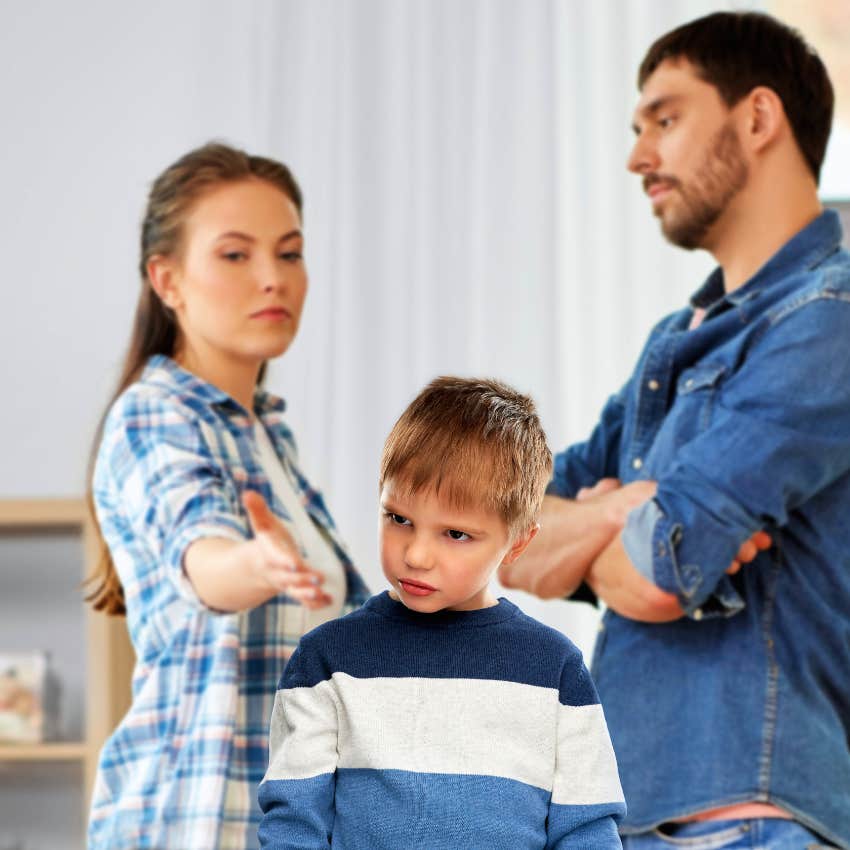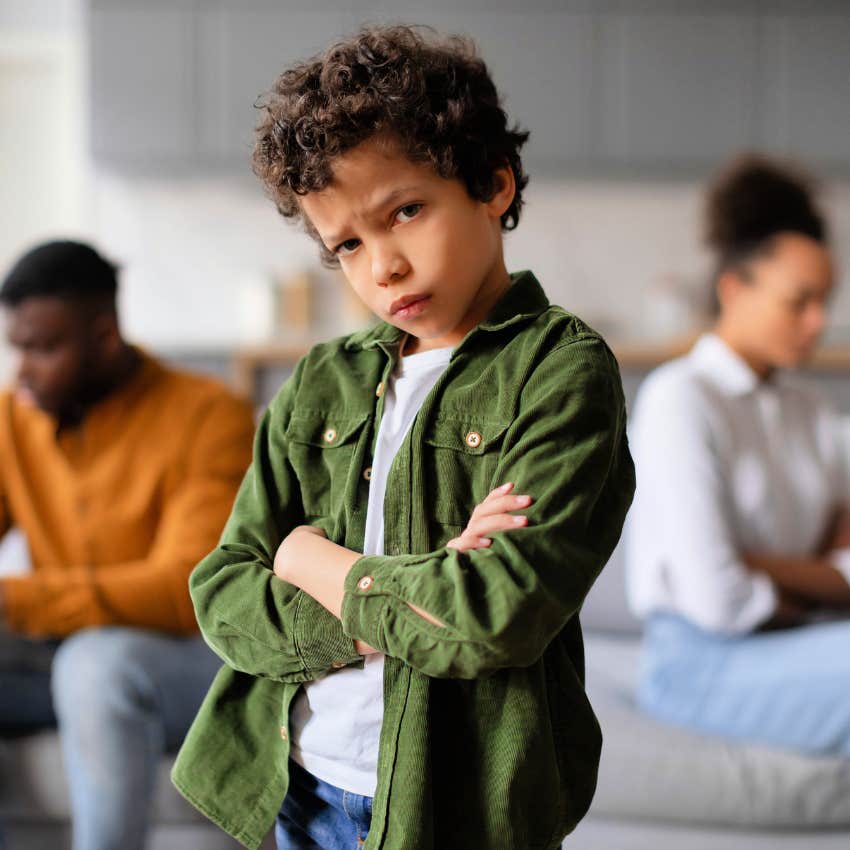People Who Blame Everyone Else For Their Problems Likely Had These 11 Childhood Experiences
When kids aren’t taught to face discomfort, they often grow into adults who run from responsibility.
 GaudiLab / Shutterstock
GaudiLab / Shutterstock It’s easy to write someone off as immature or difficult when they refuse to take responsibility for anything that goes wrong. But behavior like that rarely comes out of nowhere. People who constantly point fingers instead of looking inward usually learned that pattern early, sometimes without even realizing it. And while it's frustrating, people who blame everyone else for their problems likely had childhood experiences that led them to develop survival strategies to compensate for growing up in a home where emotional safety, consistency, or guidance were lacking.
Blame can be a shield. It keeps people from having to face shame or the possibility that they’re not always in control. That kind of deflection is often more about self-protection than selfishness, and is the result of common childhood experiences that tend to shape adults who blame first, reflect later.
1. They were criticized more than they were encouraged
Kids who are constantly told they’re wrong, messy, lazy, or not good enough often grow up feeling like any mistake defines them. When there's little balance between correction and encouragement, they learn to associate error with shame.
Harsh criticism in childhood is linked to avoidance behaviors in adulthood, especially around accountability. So instead of facing problems, they distance themselves from anything that might make them feel bad. Blaming others becomes a way to escape that feeling. They’re not trying to lie, they’re trying to protect a fragile sense of self-worth. Over time, though, this self-protection becomes a habit that’s hard to break.
2. They weren’t allowed to make mistakes
Some kids grow up in homes where perfection is expected and anything less is punished, even unintentionally. When there’s no space for trial and error, children don’t learn how to recover from failure, they learn to fear it. Developmental psychologists have found that a child’s ability to develop resilience depends on having caregivers who model patience and problem-solving, not punishment.
Without that, even small slip-ups feel threatening. Blaming others becomes a defense mechanism that helps them avoid consequences they were never taught to handle. Instead of asking, “What can I learn from this?” they ask, “How do I make this someone else’s fault?”
It’s a coping strategy rooted in fear, not entitlement.
3. They had parents who never took responsibility themselves
 dimaberlinphotos via Canva
dimaberlinphotos via Canva
Children model what they see. If a parent constantly blamed other people for their problems, their children often internalize that behavior as normal. These kids grow up believing that owning your mistakes is a weakness. If the adults in their life never apologized, explained their actions, or admitted fault, there was no blueprint for healthy self-reflection.
So as adults, they repeat the pattern of finger-pointing instead of introspection. It's not defiance. It’s familiarity.
4. They were overprotected from consequences
When kids are constantly bailed out of trouble by parents who step in to solve every problem or shift every blame, they don’t learn cause and effect. That safety net might seem caring in the moment, but it can actually stunt emotional development. Studies show that snowplow parenting — removing all obstacles in a child’s path — is linked to low resilience and externalized blame in adulthood.
These people grew up learning that problems were always someone else’s job to fix. When things go wrong, their first instinct is to deflect rather than to reflect. That habit might have kept them emotionally safe as kids, but it becomes damaging later on. Accountability feels foreign, even unfair.
5. They were punished instead of guided
In some households, discipline comes fast and hard, without explanation or conversation. Kids in those environments often learn to avoid responsibility, not because they don’t care, but because it feels dangerous. Research from the Child Mind Institute has shown that punishment-heavy parenting without emotional support leads to avoidance, anxiety, and defensive behaviors.
So instead of saying, “I messed up,” they say, “It wasn’t me.” It’s a way of sidestepping consequences that once felt overwhelming or even scary. These adults aren’t being dramatic, they’re responding to patterns that taught them blame equals safety. Real growth only happens when they learn that accountability doesn’t have to come with shame.
6. They grew up around constant chaos or instability
When a child grows up in a home where emotions are unpredictable or routines fall apart regularly, they often become hyper-focused on survival, not self-awareness. In that environment, taking blame for anything feels like a threat.
It’s not that they don’t want to be honest, it’s that they’re wired to protect themselves first. Admitting fault feels like inviting punishment, abandonment, or rejection. So they do what kept them safe as kids: they push the blame as far away from themselves as possible. And unfortunately, that instinct tends to follow them into every relationship.
7. They didn’t feel emotionally safe at home
Kids who never felt seen, heard, or supported often learn to protect their emotional world by controlling how others see them. That means staying blameless becomes a kind of armor. According to attachment theory research, children who grow up with insecure attachments tend to struggle with self-esteem and conflict resolution later in life. Blaming others allows them to preserve the illusion that they’re okay, even when they’re not. It keeps their vulnerable parts hidden.
But while this behavior may have helped them feel safe growing up, it creates walls between them and others as adults. It’s hard to build trust when every problem is someone else’s fault.
8. They were constantly compared to others
 Syda Productions via Canva
Syda Productions via Canva
Being told you’re not as smart as your sibling, not as successful as your cousin, or not as well-behaved as a friend creates a deep sense of inadequacy. These kids grow up with a fragile ego, and even small criticisms feel like proof that they’ll never measure up. Research has found that constant comparison in childhood leads to high defensiveness and low self-worth. Blaming others becomes a strategy to protect themselves from feeling less than.
It’s not that they don’t care, it’s that caring too much would hurt. So instead of internalizing failure, they externalize blame. It keeps their self-image from collapsing, even if it damages their relationships.
9. They were pressured to be the perfect child
When kids are praised only when they excel — or worse, only when they make their parents look good — they start to believe that anything less than perfect is unacceptable. That kind of pressure creates performance anxiety and makes it hard to tolerate imperfection. Over time, the fear of disappointing others turns into a fear of owning up to mistakes.
So they blame others as a way to stay on top, or at least avoid being knocked down. Even small critiques feel like a threat to their worth. And while they might appear confident, it’s often a carefully managed facade. They’re not avoiding the truth, they’re avoiding the fall.
10. They learned that apologies made them weak
 Prostock studio via Canva
Prostock studio via Canva
In some households, apologizing was seen as losing power. Maybe their parents never did it, or maybe saying sorry was mocked, punished, or ignored. That kind of environment teaches kids that admitting fault puts you at a disadvantage. So as adults, they avoid it at all costs, even when it’s obvious they’re in the wrong.
Blaming others keeps them feeling in control, but it also keeps them emotionally distant and it makes real repair nearly impossible. Apologies aren’t about weakness, they’re about connection, but that lesson often comes too late.
11. They were never taught how to reflect on their behavior
Some kids grow up with rules but no real guidance. They’re told what not to do, but never why. No one helps them think about how their actions affect others, or how to recognize patterns in their own behavior. Emotional coaching from parents plays a major role in developing self-awareness in kids.
Without it, they grow up emotionally stunted. They’re reactive, defensive, and quick to blame because they never learned how to pause and look inward. It’s not a moral failing, it’s a missing skill — one that can be learned, but only if they’re willing to try.
Sloane Bradshaw is a writer and essayist who frequently contributes to YourTango.

